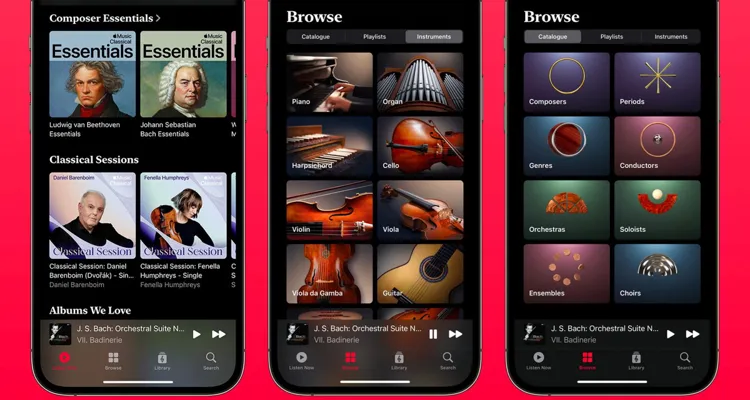After plans to release in 2022, Apple finally released its Apple Music Classical app earlier this year. Here’s what to know about the new app and why classical music fans of all levels should check it out.
Apple Music Classical provides Apple Music and Apple One subscribers with access to over five million classical music tracks, thousands of albums, and features like composer bios and deep explorative dives on key works. There’s much to love about Apple Music Classical, whether you’re a long-time fan or just getting started.
Apple Music Classical’s roots originate from Primephonic, a classical music streaming service Apple acquired in 2021. The app leverages Primephonic’s playlists and audio content, robust search capabilities, metadata, and more.
“We love music — that’s really what we’re all about — and classical music is foundational to music of all genres,” says Oliver Schusser, Apple’s Vice President of Apple Music and Beats. “Apple Music Classical is a dedicated app that is great for classical experts as well as anyone who is new to classical.”
“(With) the largest classical music selection in the world, the very best search and browse capabilities, the most premium sound experience with Spatial Audio, and thousands of exclusive recordings — we believe this is the very best classical music streaming experience available anywhere.”
The Largest Classical Music Catalog — With Expert Insights & Recommendations
More than 700 playlists are available to guide listeners through 800 years of classical works — with more to be added, Apple promises. Beginners can listen to expert commentary blended with selected works to introduce key composers, periods, instruments, and classical terminology.
Devotees can go behind the scenes of selected recordings as leading classical artists offer track-by-track audio commentary. Each week, Apple Music Classical’s handpicked Hidden Gems highlight a selection of lesser-known works, while the Composer Undiscovered playlists bring a “new perspective” to famous names.
Yeah but why is Apple Music Classical a separate app?
So why a separate app when there’s already Apple Music? The app uses a simple interface tailored explicitly for interacting with classical music, providing an experience for all listeners — from long-time classical fans to first-time listeners and everyone in between.
Instead of lyrics, users are provided detailed information from editorial notes and descriptions. Unlike the regular Apple Music app, Apple Music Classical allows users to search by composer, work, conductor, catalog number, and more.
High-Quality Audio & Exclusive Recordings
Apple Music Classical features lossless audio, up to 24 bit/192 kHz throughout the service, enabling sound enthusiasts to appreciate the nuances of each performance. A Spatial Audio catalog adds new weekly albums, with legendary recordings being remastered and contemporary performances being captured in the format.
Apple Music has partnered with classical institutions like the Berlin Philharmonic, Carnegie Hall, the Chicago Symphony Orchestra, the London Symphony Orchestra, the Metropolitan Opera, the New York Philharmonic, Opéra national de Paris, the Royal Concertgebouw Orchestra, the San Francisco Symphony, and the Vienna Philharmonic, to bring Apple Music Classical listeners new and exclusive recordings and content.
The service also hosts live performances featuring some of its partners at Apple Store locations worldwide as part of the Today at Apple programming that began in March.
Due to the nature of the Spatial Audio and other audio features, Apple Music Classical will only support iOS devices running iOS 15.4 or newer. However, an Android version of the app is now available too.
Apple Music Classical is included at no additional cost as part of an Apple Music or Apple One subscription. Notably, it is not included in the $4.99/month Apple Music Voice plan.

